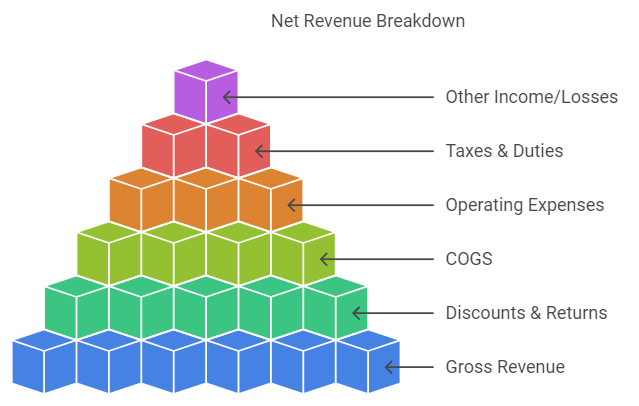Understanding net revenue is essential for anyone looking to get a clear picture of a company's financial health. Many business owners need help distinguishing between various revenue metrics, such as gross and net revenue, which can make it difficult for them to assess their company's profitability accurately.
Therefore, to help them in their cause, this article aims to provide a comprehensive understanding of net revenue, how it is calculated, and why it matters in financial statements. Using this information, Philippine businesses can effectively manage their finances, measure their revenue, and gauge their overall profitability.
This guide will also discuss the formula used to determine net revenue and provide an example calculation to illustrate its practical application. So, without much ado, let's explore how net revenue is vital in evaluating a business's financial transparency and profitability in the Philippines.

What is Net Revenue?

Net revenue is a crucial financial metric that reflects a company's actual earnings over a specific period after making necessary deductions. Unlike gross revenue, which accounts for total sales before any adjustments, net revenue offers a more accurate picture by considering real-world factors that affect financial intake.
When a business calculates its net revenue, it deducts customer discounts, client returns, and sales allowances. These components are vital to include because they represent the adjustments that reduce the total figure a company initially reports as revenue.
Net Revenue Formula: Total Revenue - Total Expenses = Net Revenue
Also Read: Applying for DTI Loans in the Philippines for Small Businesses
Importance of Net Revenue For Businesses in The Philippines
Net revenue plays a critical role in understanding a business's actual financial performance. For companies in the Philippines, it provides an accurate picture of profitability after accounting for all expenses and deductions.
Here are the key reasons why net revenue is essential for businesses in the Philippines -
1. Accurate Profit Measurement
Net revenue gives businesses a clear view of actual profit after all costs, helping gauge financial health and performance.
2. Better Decision-Making
Business owners can make data-driven pricing, cost management, and investment decisions by understanding net revenue.
3. Compliance with Tax Regulations
Net revenue calculations ensure accurate reporting for tax purposes, which is crucial for avoiding legal issues in the Philippines.
4. Investor Confidence
A solid net revenue figure attracts potential investors and stakeholders by demonstrating business profitability and growth potential.
5. Operational Efficiency
Tracking net revenue helps identify areas of inefficiency or high expenses, enabling businesses to optimize operations and improve margins.
Also Read: MSME Loan Guide for Startups and New Businesses
Crucial Components of Net Revenue For a Philippine Business
Understanding the key components that contribute to net revenue is vital for businesses in the Philippines. This is because net revenue is a company's actual income after accounting for deductions, and businesses can better assess their profitability and financial performance by focusing on these components.
Here are the crucial components that help a business calculate its net revenue in the Philippines -

1. Gross Revenue
Before any deductions, the total income generated from sales forms the foundation of net revenue.
2. Discounts and Returns
Sales discounts offered to customers and product returns reduce gross revenue, affecting the final net figure.
3. Cost of Goods Sold (COGS)
Direct costs for producing goods or services, including raw materials and labor, are subtracted from gross revenue.
4. Operating Expenses
Costs associated with running the business, such as rent, utilities, and salaries, impact the net revenue calculation.
5. Taxes and Duties
Business taxes and duties in the Philippines are essential deductions, varying based on industry and revenue thresholds.
6. Other Income or Losses
Non-operating income or losses, such as interest or asset sales, also affect the net revenue outcome.
Also Read: Understanding Common Types of Bank Loans
N90’s fast financing solutions are here to support your business goals. Apply today and take the next big step with instant funding! Get potential loan approvals within 24 hours and instantly accelerate your Philippine SME’s progress!
How to Calculate Net Revenue of Businesses in The Philippines
Calculating net revenue reveals a company's actual earnings by accounting for adjustments. Let's go through the process of calculating net revenue step-by-step to understand its components and importance.
Step 1: Determine Gross Revenue
Gross revenue is the starting point for calculating net revenue. It's the total income generated from sales before any deductions, representing the overall scale of a company's operations.
Consider it the total price customers pay for your products or services.
Step 2: Subtract the Cost of Goods Sold (COGS)
Once you have your gross revenue, the first significant deduction is the Cost of Goods Sold or COGS. COGS includes all the direct costs related to the production or delivery of your goods and services.
This can range from raw materials and labor costs to manufacturing expenses or any outsourced work specifically connected to the production process.
Step 3: Deduct Returns and Allowances
After accounting for COGS, you must subtract any returns and allowances. These represent refunds given to customers who return products or allowances made for damaged goods or discrepancies in service.
Effectively, it reduces the total sales revenue by recognizing these adjustments.
Step 4: Subtract Discounts Offered
Next, account for any discounts you might have offered. Discounts can take various forms, such as seasonal sales or promotional offers, to encourage purchases. These amounts should be subtracted from the gross revenue to reflect the actual earnings.
Step 5: Address Other Transactional Expenses
Finally, consider any other transactional expenses, like refunds, that must neatly fit into the previous categories. These might include billing errors or other unforeseen financial adjustments.
Addressing these ensures that the net revenue accurately reflects the company’s actual financial performance.
Are you still unclear on how to calculate your business's net revenue? Check out this video. It provides a clear explanation of how to calculate net revenue, including the formula: Net Revenue = Gross Revenue - COGS.
Also Read: Choosing and Registering a Dominant Business Name
Accounting Methods For Recognizing Net Revenue

Accurately recognizing net revenue is essential for understanding a business's financial health, as different accounting methods can impact when and how revenue is recorded.
So, Philippine businesses must always choose the method that best aligns with their operations and legal requirements to ensure transparency and compliance.
Here are the standard accounting methods utilized for recognizing net revenue in the Philippines -
1. Accrual Accounting
Revenue is recognized when earned, regardless of when payment is received. This method provides a clearer view of a business's financial status and is commonly used in larger organizations.
2. Cash Accounting
Revenue is recorded only when cash is received. This simpler method, typically preferred by small businesses, focuses on actual cash flow.
3. Percentage-of-Completion Method
This method, used for long-term contracts, recognizes revenue as a project progresses based on estimated completion stages. It is common in the construction and manufacturing industries.
4. Completed Contract Method
Revenue is recognized only when a contract is fully completed. It is often used when it’s challenging to estimate project progress or when contract terms are short.
Also Read: Accessing Best Unsecured Personal Loans Without Collateral in 2024
Critical Differences Between Gross vs. Net Revenue in The Philippines
While both metrics provide insight into financial performance, they serve different purposes in assessing a company's overall health and profitability. Here, take a look at the critical differences between gross and net revenue for business in the Philippines -
1. Core Function
Gross revenue represents a business's total income from sales or services before any expenses or deductions. It reflects a company's ability to generate sales but does not account for the costs involved in production or operations.
In contrast, net revenue is what remains after subtracting discounts, returns, allowances, and direct costs like the cost of goods sold (COGS), giving a more accurate picture of profitability.
2. Expenses and Deductions
Gross revenue is purely focused on the top-line sales figures and does not consider any expenses. It’s ideal for understanding overall market demand.
On the other hand, net revenue accounts for all relevant deductions, such as operational expenses, taxes, and other business costs, providing a clearer view of the business’s actual earnings.
3. Usage in Financial Analysis
Gross revenue is often used to gauge a business's total market potential and sales performance, which is helpful for sales teams and market analysis.
However, net revenue is more critical for financial reporting, tax purposes, and understanding true profitability, which is crucial for business owners and investors looking at the bottom line.
4. Impact on Decision Making
While gross revenue gives a good sense of sales volume and growth, it can sometimes be misleading if the costs of generating those sales are high.
On the other hand, net revenue is a more valuable metric for making informed decisions about cost-cutting, pricing strategies, and profit maximization, ensuring the long-term sustainability of a business in the Philippines.
Do you know the difference between net revenue and profit? Check out this Reddit thread to learn more. Here, a Reddit user explained the difference between net revenue and profit, clarifying that net revenue accounts for deductions such as discounts and returns from total revenue. In contrast, profit includes further deductions like COGS and all other expenses.
Also Read: Startup Funding and Angel Investors in the Philippines
Example of Deductions in Net Revenue Calculation in The Philippines
To better understand how net revenue is calculated, let's walk through a practical example involving a retail company that processes a significant volume of product orders.
Imagine a company receiving 100,000 product orders in a fiscal year, with an average order value of PHP 20. With this information, we can initially calculate the gross revenue:
Gross Revenue = Average Order Value X Number of Orders = PHP 20 X 100,000 = PHP 2 million.
However, the accurate revenue picture becomes more evident when we account for deductions. Let's start by examining returns. If 5% of the orders were returned, this equates to 5,000 returns. The value to be deducted for these returns is as follows -
Total Order Returns = 5,000 X PHP20 = PHP 100k
Next, consider the impact of discounts. The company offered a 10% discount to specific customers, which was availed by 20% of the total orders. This means 20,000 orders received a discount -
Discount amount per order = 10% X PHP 20 = PHP 2
Total discount value = 20,000 X PHP 2 = PHP 40k
Taking these deductions into account, the net revenue is calculated by subtracting both the returns and the discounts from the gross revenue:
Net Revenue = PHP 2 million - PHP 100k - PHP 40k = PHP 1.86 million.
This calculation showcases how the company adjusted revenue after considering customer returns and promotional incentives, significantly differing from the initial gross revenue figure. It offers a more accurate reflection of the company’s retained earnings and availability for reinvestment or distribution.
Also Read: Applying for a Safe and Legit Personal Loan Online in the Philippines
What is The Strategic Importance of Net Revenue Insights For Philippine Businesses
Net revenue insights are crucial for businesses in the Philippines as they provide a clear view of actual earnings after all expenses, discounts, and deductions. These insights are essential in driving business strategies, improving profitability, and ensuring long-term growth.
Here are the strategic benefits of net revenue insights for businesses operating in the Philippines -
1. Accurate Profitability Assessment
Net revenue insights allow businesses to assess profitability by considering all costs and expenses. This helps understand how much of the total income is retained after necessary deductions.
2. Improved Financial Planning
With a clear view of net revenue, businesses can create more realistic and practical financial plans. This enables better budgeting, cash flow management, and resource allocation.
3. Cost Optimization
By analyzing net revenue, businesses can identify areas where costs are high, such as operational inefficiencies or product returns, and implement strategies to minimize these expenses, boosting profitability.
4. Data-Driven Decision Making
Net revenue insights equip business leaders with the necessary data to make informed decisions. Knowing the actual financial standing helps guide actions such as setting prices, launching new products, or expanding.
5. Enhanced Investor Relations
Showcasing substantial net revenue is critical for businesses looking to attract investors. It provides proof of sustainable profitability and financial health, increasing investor confidence and potential funding opportunities.
Conclusion
In conclusion, as we have seen from this detailed article, understanding net revenue is crucial for any business aiming to assess its financial performance accurately. By deducting essential expenses like discounts, returns, and cost of goods sold from gross revenue, net revenue provides a clear picture of the company’s actual earnings.
Moreover, net revenue not only helps in financial reporting but also aids in optimizing operations and pricing strategies. So, by regularly calculating and analyzing net revenue, businesses can identify areas for improvement, reduce unnecessary costs, and enhance overall profitability.
Ultimately, it is fair to say that mastering net revenue is a crucial component in achieving long-term business success in the Philippines. This is because the figure acquired at the end is vital for business leaders to gauge their business’s profitability, manage costs, and make the right financial decisions about growth strategies.
Frequently Asked Questions (FAQs)
1. How do you explain net revenue?
Net revenue is a business's actual income after deducting costs like discounts, returns, and allowances from its total (gross) revenue. It reflects the actual earnings generated from sales, providing a clearer picture of profitability.
Unlike gross revenue, which represents all sales, net revenue shows how much a company retains after accounting for expenses.
2. How do we calculate net revenue percentage?
To calculate net revenue percentage, divide net revenue by gross revenue, then multiply by 100.
The formula is:
Net Revenue Percentage = (Net Revenue / Gross Revenue) × 100
This percentage shows how much of the total revenue remains after deducting discounts, returns, and allowances, giving insight into a company’s profitability relative to its total sales.
3. What is a good net revenue?
A good net revenue varies by industry but typically represents a high percentage of gross revenue, indicating effective cost management. A 10-20% net profit margin is vital in many industries.
This is mainly because businesses with higher percentages demonstrate better profitability, while lower figures may suggest higher expenses or inefficiencies that need to be addressed to improve financial performance.
4. Is net revenue a KPI?
Yes, net revenue is a critical Key Performance Indicator (KPI) for businesses, as it reflects a company’s actual earnings after accounting for expenses like discounts and returns.
Net revenue is a key performance indicator (KPI) that helps assess profitability, operational efficiency, and overall financial health. It guides businesses in decision-making, cost management, and growth strategies and is crucial for measuring long-term sustainability and success.













